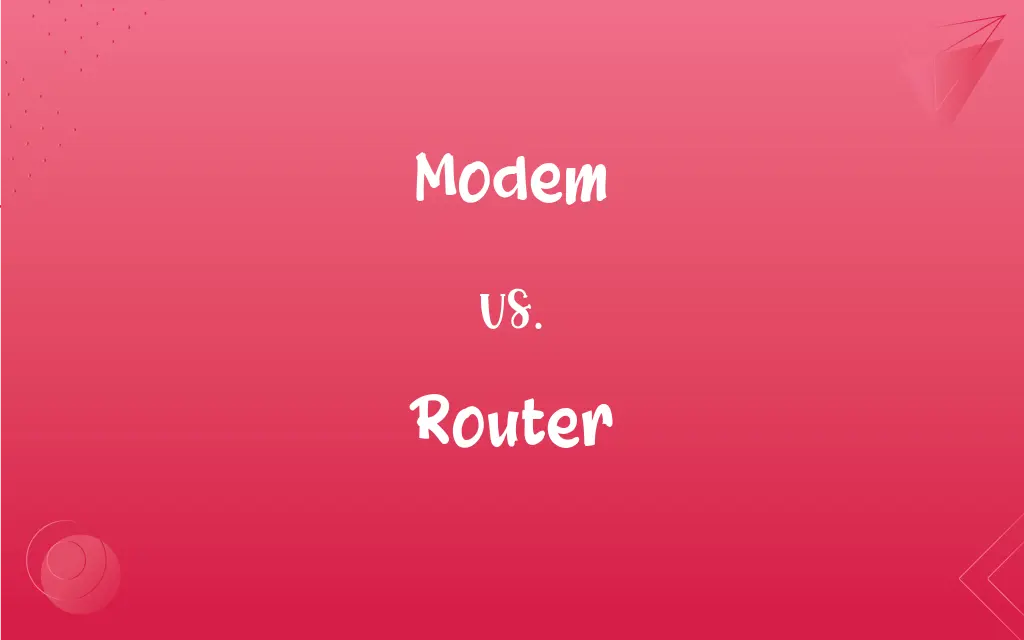Modem vs. Router: What's the Difference?
Edited by Janet White || By Harlon Moss || Updated on October 10, 2023
A modem connects your network to the internet, while a router connects your devices to the Wi-Fi and directs data packets between them or to the internet via the modem.

Key Differences
In the digital world, where internet connectivity has become nearly as vital as electricity, understanding network hardware, notably modems and routers, is beneficial. A modem, derived from "Modulator-Demodulator," is a device that modulates and demodulates analog signals from digital data, essentially facilitating a connection to internet services. Conversely, a router is a device that efficiently directs data packets between your home network and the internet via the modem, ensuring that the data reaches its appropriate destination.
Navigating through the depths of internet connectivity, the modem acts as the gatekeeper to the web. It provides a bridge between the local network in a home or business and the vast internet, converting digital data from a computer into the analog signal required by phone lines or cable systems. In juxtaposition, the router takes on a more managerial role, orchestrating the flow of data packets within a local network, and managing the exchange of data between your local devices and the internet through the modem.
The modem’s purpose remains consistent and clear: to translate digital data from a computing device into the analog signal that can travel across telecommunication lines. Whether via telephone lines (DSL), cable systems, or fiber-optic cables, the modem is the pivotal point of access to the internet. Whereas the router, while not obligatory for internet access, is essential for creating a local network. It allows multiple devices to connect to that network, shares the internet connection among the devices, and enables them to communicate with each other locally without utilizing internet bandwidth.
A viable analogy might consider the modem as the home’s gateway to the worldwide internet. Without a modem, accessing the internet from a residential location becomes unattainable as it links your internal network to your Internet Service Provider (ISP). On the other hand, the router could be viewed as a diligent traffic manager, efficiently directing, distributing, and managing data packets within your local network and between your devices and the world wide web via the modem.
Comparison Chart
Primary Function
Converts digital data for transmission
Directs data to appropriate devices
ADVERTISEMENT
Internet Connection
Provides connection to the internet
Does not provide internet connection
Device Connectivity
Does not create a local network
Allows multiple devices to connect via Wi-Fi or Ethernet
Data Management
Does not manage local data traffic
Manages the flow of data between devices and the internet
Security Features
Limited security features
Often has built-in firewalls and security protocols
Modem and Router Definitions
Modem
Different types of modems provide access via diverse telecommunication technologies, like cable, DSL, or fiber-optics.
Cable modems provide internet connectivity via the coaxial cables used for cable TV.
ADVERTISEMENT
Router
A router directs data packets between a local network and the internet.
The router ensures that my laptop and smartphone can browse the internet simultaneously.
Modem
A modem is a device that modulates and demodulates digital and analog signals to enable internet access.
Without a modem, connecting your local network to the internet is impossible.
Router
Routers enable multiple devices to connect to a local network, sharing a single internet connection.
I use a router to allow all the devices in my home to connect to Wi-Fi.
Modem
Modems ensure communication between your local network and your internet service provider (ISP).
The modem communicates with your ISP to bring internet connectivity into your home.
Router
Routers often incorporate firewalls and security protocols to protect network data.
My router uses WPA3 encryption to secure the information transmitted across my network.
Modem
Modems can vary in speed and capabilities depending on the technology and standards they adhere to.
Older modems might not deliver internet speeds as fast as newer models due to technological advancements.
Router
Routers can be wired or wireless, affecting how devices connect to them.
I prefer a wireless router so I can move my laptop around the house while staying connected.
Modem
Modems can be internal or external devices facilitating internet connectivity through various telecommunication lines.
The DSL modem uses telephone lines to establish an internet connection.
Router
Routers manage local traffic between devices within a network, even without internet.
The router lets my printer communicate with my computer to print documents.
Modem
A device that transmits and receives data using a modulated carrier wave. Modems are used to establish network and internet connections.
Router
One that routs, especially a machine tool that mills out the surface of metal or wood.
Modem
A device that encodes digital computer signals into analog/analogue telephone signals and vice versa and allows computers to communicate over a phone line.
Router
One that routes, especially one who prepares shipments for distribution and delivery.
Modem
To transmit by modem.
Modem
An electronic device that converts electronic signals into sound waves, and sound waves into electronic signals, used to transmit information between computers by the use of ordinary telephone lines; also called modulator-demodulator; as, the latest modems can transmit data at 56,000 baud over a clear telephone line. The speed of transmission of information by a modem is usually measured in units of baud, equivalent to bits per second.
Modem
(from a combination of MOdulate and DEModulate) electronic equipment consisting of a device used to connect computers by a telephone line
FAQs
Why do I need a router for Wi-Fi?
A router creates a Wi-Fi network allowing multiple devices to connect wirelessly.
What is a modem?
A modem is a device that converts digital data to analog signals to facilitate internet access through telecommunication lines.
Can I use a modem without a router?
Yes, for connecting a single device to the internet directly, but a router is needed for a local network.
Can I use a router without a modem?
Yes, for creating a local network between devices, but internet access requires a modem.
Is a password needed for a router?
It's advisable to secure your router with a password to prevent unauthorized access.
Can a router connect to multiple devices?
Yes, routers can typically connect to numerous devices simultaneously, sharing network access.
What is a wireless router?
A wireless router allows devices to connect to the local network via Wi-Fi.
How do modems and routers connect to devices?
Modems connect directly via an Ethernet cable, while routers connect via cable or wirelessly through Wi-Fi.
Why do routers have antennas?
Antennas help routers spread the Wi-Fi signal throughout the coverage area.
Can a modem and router be too old for use?
Technological advancements can render older modems and routers incompatible or inefficient with current networks and devices.
Do routers and modems need to be from the same brand?
No, but ensuring compatibility between the devices is crucial.
Can I use my modem and router separately?
Yes, but integrating both into a network optimizes device connectivity and internet access.
Does the router affect internet speed?
Yes, routers have limits on data transmission speeds and ranges affecting your network’s internet speed.
Do all modems provide the same internet speed?
No, modems vary in speeds, adhering to different standards and technologies.
Can a router improve my internet connection?
While it won’t increase your ISP-given speed, a quality router can ensure efficient data packet management, possibly providing a smoother online experience.
How does a modem receive data?
The modem receives digital data, converts it to an analog signal for transmission across telecommunication lines.
What is the role of a router?
A router directs data packets within a local network and between the network and the internet, also enabling multiple devices to connect to the network.
Can a modem-router combo be used?
Yes, combined devices (gateways) provide the functionalities of both modems and routers in one unit.
How does a modem connect to the ISP?
Modems connect to ISPs via telecommunication lines, like telephone lines or coaxial cables.
Can I install a router without professional help?
Yes, most routers have user-friendly setup processes, and ISP-provided routers often come with instructions.
About Author
Written by
Harlon MossHarlon is a seasoned quality moderator and accomplished content writer for Difference Wiki. An alumnus of the prestigious University of California, he earned his degree in Computer Science. Leveraging his academic background, Harlon brings a meticulous and informed perspective to his work, ensuring content accuracy and excellence.
Edited by
Janet WhiteJanet White has been an esteemed writer and blogger for Difference Wiki. Holding a Master's degree in Science and Medical Journalism from the prestigious Boston University, she has consistently demonstrated her expertise and passion for her field. When she's not immersed in her work, Janet relishes her time exercising, delving into a good book, and cherishing moments with friends and family.
































































